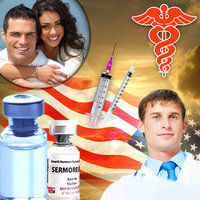
Growth Hormone Deficiency (GHD) can impact individuals at different stages of their lives - childhood and adulthood. However, there is a clear distinction between these two conditions. The childhood onset growth hormone deficiency, also known as pediatric growth hormone deficiency, is a condition that hampers a child's normal growth due to less production of growth hormone by the pituitary gland. This condition is identified and treated during a child's development phase to promote normal growth.
On the other hand, Adult Growth Hormone Deficiency (AGHD) affects individuals who have completed their growth phase and have achieved their full height. The deficiency of growth hormone in adults can result from various causes, including pituitary tumors, head trauma, or the natural aging process. AGHD typically does not manifest during childhood. As the diagnosis, treatment, and management greatly vary for pediatric GHD and AGHD, it is crucial to distinguish between these two conditions.
Our specialist clinic focuses on the treatment of patients above 30 dealing with growth hormone deficiency. To address your concerns and receive appropriate guidance regarding AGHD, you are encouraged to consult with the board-certified doctors at our clinic.
Can Childhood GHD Lead to Adult Onset GHD?
It is uncommon but possible for a person diagnosed with pediatric GHD to continue experiencing growth hormone issues transitioning into adulthood, potentially leading to AGHD. This scenario depends on several factors:
1. Persistent GHD: The ongoing pituitary gland dysfunction or other medical conditions affecting hormone production can result in consistent growth hormone insufficiency from childhood to adulthood.
2. Ageing: Natural ageing brings a decline in growth hormone production which may be excessive in some individuals, leading to AGHD development.
3. Secondary Causes: Certain treatments or medical conditions related to childhood GHD can increase the risk of AGHD onset, such as surgery or radiation therapy for treating pituitary tumors.
4. Genetic Factors: Some people may have genetic factors making them susceptible to childhood GHD and AGHD.
It's important to note that transitioning from pediatric GHD to AGHD is not a common occurrence. Many individuals diagnosed with pediatric GHD exhibit significant improvement in growth and health after receiving appropriate treatment during their childhood. As they grow into adulthood, their growth hormone production often stabilizes or normalizes.
Consultation and Treatment for AGHD
Anyone with a childhood GHD history experiencing symptoms suggesting AGHD in adulthood must consult our clinic's endocrinologists specializing in hormone-related disorders in adulthood. Comprehensive evaluations and testing will be necessary to identify the symptom's cause and whether the patient has developed AGHD or if other factors are involved. Depending on the specific diagnosis and underlying causes, treatment options may vary.
Contact Us For A Fast And Professional Response

- Comprehensive Therapy Regimen Shown to Reverse Symptoms of Early Alzheimer's and Cognitive Decline [Last Updated On: March 6th, 2025] [Originally Added On: February 27th, 2021]
- Weekly Therapy for Adult Growth Hormone Deficiency Approved by FDA [Last Updated On: January 15th, 2025] [Originally Added On: March 26th, 2021]
- Hormone Replacement Therapy – a Bad Rap? [Last Updated On: January 16th, 2025] [Originally Added On: August 16th, 2021]
- Seven Traits Associated with Good Health and Longevity [Last Updated On: September 6th, 2024] [Originally Added On: September 7th, 2021]
- Why Do I Have Growth Hormone Deficiency? [Last Updated On: January 15th, 2025] [Originally Added On: October 25th, 2021]
- Look Out For Those Hormone Scammers! [Last Updated On: January 19th, 2025] [Originally Added On: April 5th, 2022]
- My Millennial Transformation [Last Updated On: January 20th, 2025] [Originally Added On: June 5th, 2022]
- Running and Getting Nowhere [Last Updated On: January 27th, 2025] [Originally Added On: August 25th, 2022]
- Just Limited Exposure to New Anti-Aging Treatment Has Same Effect as Lifelong Treatments [Last Updated On: January 30th, 2025] [Originally Added On: September 4th, 2022]
- Having a Positive Outlook Can Make Your HGH Therapy Work Better [Last Updated On: December 27th, 2024] [Originally Added On: February 1st, 2023]
- My Friend Told Me to Ignore my Prescription and Double my HGH Intake – Is This a Good Idea? [Last Updated On: December 28th, 2024] [Originally Added On: March 17th, 2023]
- Self-Administering HGH Injections: Messy and Painful [Last Updated On: December 28th, 2024] [Originally Added On: March 23rd, 2023]
- Are You the Fourteenth Man? [Last Updated On: January 1st, 2025] [Originally Added On: March 30th, 2023]
- Should I Get My Hormone Levels Checked? [Last Updated On: December 29th, 2024] [Originally Added On: April 6th, 2023]
- HGH Causes Weight Loss [Last Updated On: January 2nd, 2025] [Originally Added On: April 12th, 2023]
- Will HGH Replacement Therapy Mess up the Balance of my Other Hormones? [Last Updated On: December 29th, 2024] [Originally Added On: April 21st, 2023]
- The Effects of Human Growth Hormone on Men's Confidence and Attractiveness [Last Updated On: January 2nd, 2025] [Originally Added On: April 28th, 2023]
- HGH Case Study: What Terrible Thing Happened to Jeff? [Last Updated On: January 5th, 2025] [Originally Added On: May 4th, 2023]
- The Effect of Radiation on Human Growth Hormone Levels [Last Updated On: February 5th, 2025] [Originally Added On: May 17th, 2023]
- Ibiza Club DJ Thought He’d Never Dance or Make Love Again [Last Updated On: February 5th, 2025] [Originally Added On: May 25th, 2023]
- HGH Deficiency During Childhood [Last Updated On: February 24th, 2025] [Originally Added On: September 22nd, 2023]
- What are the Mental and Psychological Effects of Adult-Onset HGH Deficiency? [Last Updated On: February 25th, 2025] [Originally Added On: September 28th, 2023]
- Potential Mental and Psychological Impacts of Adult-Onset HGH Deficiency [Last Updated On: February 11th, 2025] [Originally Added On: February 11th, 2025]
- Revolutionary Therapy Regimen Reverses Early Alzheimer’s Symptoms [Last Updated On: March 1st, 2025] [Originally Added On: March 1st, 2025]

















